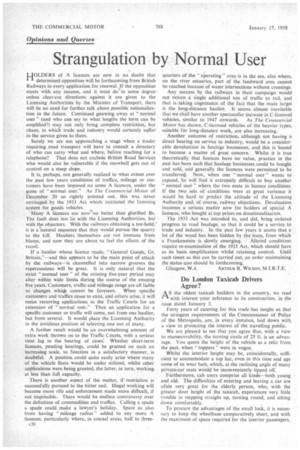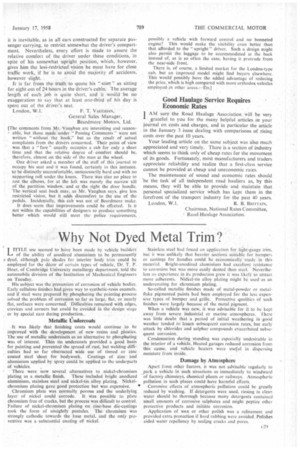Opinions and Queries
Page 66

Page 69

If you've noticed an error in this article please click here to report it so we can fix it.
Strangulation by Normal User
HOLDERS of A licences are now in no doubt that determined opposition will be forthcoming from British Railways in every application for renewal. If the opposition Meets with any success, and it must do in some degree•
unless clear-cut directions against it are given to the Licensing Authorities by the Minister of Transport, there will be no need for further talk about possible nationaliza tion in the future. Continued gnawing away at "normal user" (and who can say to what lengths the term can be amplified?) may not only bring complete restriction, but chaos, in which trade and industry would certainty suffer' in the service given to them.
Surely we are not approaching a stage when .a trader requiring road transport will have to consult a directory
of who can carry what and where, before reaching for a telephone? That does not exclude British Road Services who would also be vulnerable if the snowball gets out of control on a steep slope.
It is, perhaps, not generally realized to what extent over the past few years conditions of traffics, mileage or cus tomers have been imposed on some A licences, under the guise of "normal user." As The Commercial Motor of December 20 so rightly pointed out, this was never envisaged by the 1933 Act which instituted the licensing system for goods vehicles.
Many 'A licences are now no better than glorified Bs. The fault does not lie with the Licensing Authorities, but with the objectors. With the railways obtaining a toe-hold,' it is a natural sequence that they would pursue the quarry to the kill. Hauliers themselves are not immune from blame, and now they are about to feel the effects of the recoil.
If a haulier whose licence reads: "General Goods, Gt. Britain,"—and this appears to be the main point of attack by the railways—is channelled into narrow grooves the repercussions will be great. it is only natural that the strict "normal user" of the existing five-year period may alter within wide limits during the course of the ensuing five years. Customers, traffie and mileage range are all liable to changes whiqb cannot be foreseen. When specific customers and traffics cease to exist, and others arise, it will mean recurring applications to the Traffic Courts for an extension of " normal user." Then an application for a specific customer or traffic will come, not from one haulier, but from several, it would place the Licensing Authority in the invidious position of selecting one out of many.
A further result would he an overwhelming amount of extra work thrown on to the Traffic Courts, with a serious time lag in the hearing of cases'. Whether short-term licences, pending hearings, could be granted on such 'an increasing scale, to function in a satisfactory manner, is doubtful. A position could quite easily arise where many of the vehicle fleets would be under utilized, whilst other applications were being granted, the latter, in turn, working at less than full capacity.
There is another aspect of the matter, if restriction is successfully pursued to the bitter end_ Illegal working will become more rife and enforcement made more difficult, if not impossible. There would be endless controversy over the definition of commodities and traffics. Calling a spade a spade could_ make a lawyer's holiday. Spare us also from having mileage radius" added to any more A licences, particularly where, in coastal areas, half to three c26 quarters of the operating area is in the sea, also where, on the river estuaries, part of the landward area cannot be reached because of water intersections without crossings.
Any success by the railways in their campaign would not return a single additional ton of traffic to rail, and that is taking cognizance of the fact that the main target is the long-distance haulier. It seems almost inevitable that we shall have another spectacular increase in C-licensed vehicles, similar to 1947 onwards. As The Commercial Motor has shown, C-licensed vehicles of the heavier types, suitable for long-distance work, are also increasing.
Another outcome of restriction, although not having a direct bearing on service to industry, would be a considerable devaluation in haulage businesses, and. this is bound to become a matter of great concern., Whilst it is true theoretically that licences have no value, practice in the past has been such that haulage businesses could be bought and sold, and generally the licences were permitted to be transferred_ Now; when one "normal user" wants to expand, he will 'find it extremely difficult to buy another " normal user where the two mate in licence conditions. If the two sets of conditions were at great variance it would bc hard to predict the attitude of the Licensing Authority and, of Course, railway objections. Devaluation becomes a serious matter now for holders of special A licences, who bought at top prices on denationalization.
The 1933 Act was intended to, and did, bring ordered progress to road haulage, so that it could be a service to trade and industry. In the past few years it seems that a lot of the wood has been hidden by the trees, front which a Frankenstein is slowly emerging. Altered conditions require re-examination of the 1933 Act, which should have as its basis ,sirnplilication whilst retaining control. Until such times as this can be carried out, an order maintaining the status quo should be forthcoming.
Glasgow, W.4. ARTHUR R. WILSON, M.I.R.T.E.
Do London Taxicab Drivers Agree?
AS the oldest taxicab builders in the country, we read with interest your reference to its construction, in the issue dated January 3.
Forty years of catering for this trade has taught us that the stringent requirements of the Commissioner of Police of the Metropolis, are, in every instance, laid down with a view to protecting the interest of the travelling public.
We are pleased to see that you agree that, with a view to manceuvrability, the turning circle of 25 ft. is an advantage. You quote the height of the vehicle as a relic from the past, when " toppers " were in vogue.
Whilst the interior height may be, coincidentally, sufficient to accommodate a top hat, even in this time and age some of us wear hats, which, at the reclining angle of many private-car seats would be inconveniently tipped off. Furthermore, cab users comprise all kinds—both young and old. The difficulties of entering and leaving a car are often very great for the elderly person, who, with the greater door height of the taxicab, experiences very little trouble in stepping straight up, turning round, and sitting down comfortably.
To procure the advantages of the small lock, it is necessary to keep the wheelbase comparatively short, and with the maximum of space required for the interior passengers,
it is inevitable, as in all cars constructed for separate passenger carrying. to restrict somewhat the driver's compartment. Nevertheless, every effort is made to assure the relative comfort of the driver under these conditions, in spite of his somewhat upright position, which, however, gives him the les-restricted vision he must have for close. traffic work, if he is to avoid the majority oT accidents, however slight. It is far from the truth to quote his "stint as sitting for eight out of 24 hours in the driver's cabin. The average length of each job is quite short, and it wodld be no exaggeration to say that at feast one-third of his day is spent out of the driver's seat. London, WA. E T. VAID:11 IAN;
General Sales Manager, Beardmore Motors, Ltd.
[The comments from Mr. Vaughan are interesting and reason ' able, but those made -under Passing Comments' were not written " without the book," but as the result of actual complaints from the drivers concerned. Their point of view was that a "fare usually occupies a cab for only a short time and that the relative degree of comfort should be, therefore, almost on the side of the man at the wheel.
One driver asked a member of the staff of this journal to occupy his seat and it was found, certainly in this instance, to be distinctly uncomfortable, unnecessarily hard and with no supporting roll underthe knees. There was also no place to rest the elbows, for at the left was merely the narrow sill of the partition 'window, and at the right the door handle. The vertical seat back may. as Mr. Vaughan says. give less restricted vision, but it adds discomfort to the use of the pedals. incidentally, this cab was not of Beardmore make.
It does seem that improvements could be effected. Is it not within the capabilities of designers to produce something better which would still meet the police requirements,
possibly a vehicle with forward control and no bonneted engine? This would make the visibility even better than that afforded to the " upright " driver, Such a design might also permit the luggage to be accommodated at the hack instead of, as is so often the case, having it protrude from the near-side front.
There is, of course, a limited market for the London-type cab, but an improved model might find buyers elsewhere. This Would possibly have the added advantage of reducing the price, which is high compared with more orthodox vehicles employed:in other areas.--Em]
Good Haulage Service Requires Economic Rates
I AM sure the Road Haulage Association, will be very I .grateful to you for the many helpful articles in your journal on costs and charges, and in particular the article in the January 3 .issue dealing with comparisons of rising costs over the past 10 years. Your leading article on the same subject was also much appreciated and very timely. There is a section of industry which seems to think only of cheap rates for the movement of its goods. Fortunately, most manufacturers and traders appreciate reliability and realize that a first-class service cannot be provided at cheap and uneconomic rates.
The maintenance of sound and economic rates should be the task" of all independent road hauliers as, by this means, they will be able to provide and maintain that personal specialized service which has kept them in the forefront of the transport industry for the past 40 years. London, W.1. R. B. BRITTA1N, Chairman, National Rates Committee, Road Haulage Association.
















































































































